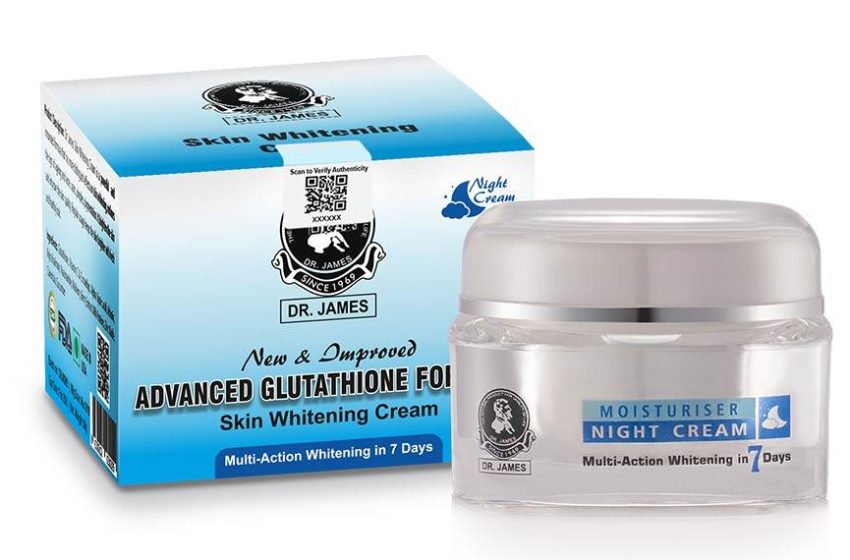The Difference Between Glutathione and Other Skin Whitening Ingredients

Skin whitening products are increasingly popular in the beauty industry, with many consumers seeking a brighter and more even complexion. Among the myriad of ingredients available, glutathione has gained significant attention for its skin-lightening properties. In this blog post, we will explore the differences between glutathione and other common skin whitening ingredients, highlighting the unique benefits and advantages of using glutathione-based products like Dr. James Advance Glutathione Whitening Cream.
Understanding Glutathione
Glutathione is a powerful antioxidant naturally produced in the body, composed of three amino acids: cysteine, glutamine, and glycine. It plays a crucial role in various bodily functions, including detoxification, immune response, and skin health. Its skin whitening properties are primarily attributed to its ability to inhibit the enzyme tyrosinase, which is responsible for melanin production. By reducing melanin synthesis, glutathione helps to lighten hyperpigmentation, dark spots, and uneven skin tone.
Unique Benefits of Glutathione
- Antioxidant Properties: Glutathione is known for its potent antioxidant effects, protecting the skin from oxidative stress caused by environmental factors such as pollution and UV radiation. This helps prevent premature aging and maintains skin health.
- Skin Repair: By promoting cellular regeneration and repair, glutathione aids in healing damaged skin. This is particularly beneficial for individuals with acne scars or other forms of skin damage.
- Safe and Gentle: Unlike some chemical whitening agents, glutathione is generally considered safe for all skin types, including sensitive skin. It does not cause irritation or adverse reactions, making it a preferred choice for many consumers.
- Holistic Benefits: Beyond skin whitening, glutathione contributes to overall skin health, improving texture and radiance. This multifaceted approach makes it a valuable ingredient in skincare formulations.
Comparing Glutathione with Other Skin Whitening Ingredients
1. Hydroquinone
Hydroquinone is a well-known skin whitening agent that works by inhibiting melanin production. While it is effective, it has been associated with several side effects, including skin irritation, redness, and even a condition called ochronosis, which causes bluish-black discoloration of the skin with prolonged use. In contrast, glutathione offers a gentler alternative with fewer risks, making it a safer option for long-term use.
2. Kojic Acid
Kojic acid, derived from fungi, is another popular ingredient in skin whitening products. It also inhibits tyrosinase, similar to glutathione. However, kojic acid can cause skin irritation and sensitivity in some individuals. Glutathione, being a naturally occurring substance in the body, is less likely to cause adverse reactions, providing a more tolerable option for those with sensitive skin.
3. Arbutin
Arbutin is a natural compound found in various plants, known for its skin-lightening effects. It works by slowly releasing hydroquinone when applied to the skin. While arbutin is considered safer than hydroquinone, it may still cause irritation in some users. Glutathione, with its antioxidant properties and gentle nature, presents a more holistic solution for skin whitening without the risk of irritation.
4. Niacinamide
Niacinamide, or vitamin B3, is another ingredient gaining popularity for its skin brightening effects. It helps to reduce the appearance of dark spots and uneven skin tone while also providing anti-inflammatory benefits. While niacinamide is effective, it does not possess the same potent antioxidant properties as glutathione. Combining niacinamide with glutathione can enhance overall skin health and brightness.
5. Vitamin C
Vitamin C is a powerful antioxidant that helps brighten the skin and reduce hyperpigmentation. It works by inhibiting tyrosinase and promoting collagen production. While vitamin C is effective, it can be unstable and may cause irritation in some individuals. Glutathione, on the other hand, is stable and less likely to cause skin reactions, making it a safer choice for daily use.
Why Choose Dr. James Advance Glutathione Whitening Cream?
Dr. James Advance Glutathione Whitening Cream harnesses the power of glutathione to provide a safe and effective solution for achieving a brighter complexion. Here are some reasons to consider this Glutathione Whitening Cream:
- Effective Formulation: The cream is specifically formulated with a high concentration of glutathione, ensuring optimal results in reducing hyperpigmentation and promoting an even skin tone.
- Gentle on Skin: With its non-irritating formula, Dr. James Advance Glutathione Whitening Cream is suitable for all skin types, including sensitive skin.
Conclusion
In the pursuit of a brighter and more even complexion, it’s essential to understand the differences between various skin whitening ingredients. Glutathione stands out as a powerful and safe option, offering unique benefits that set it apart from other common agents like hydroquinone, kojic acid, arbutin, niacinamide, and vitamin C.
By choosing glutathione-based products like Dr. James Glutathione Whitening Cream, individuals can experience the advantages of a gentle, effective, and holistic approach to skin whitening. With its potent antioxidant properties, glutathione not only addresses hyperpigmentation but also promotes overall skin health, repair, and protection.

